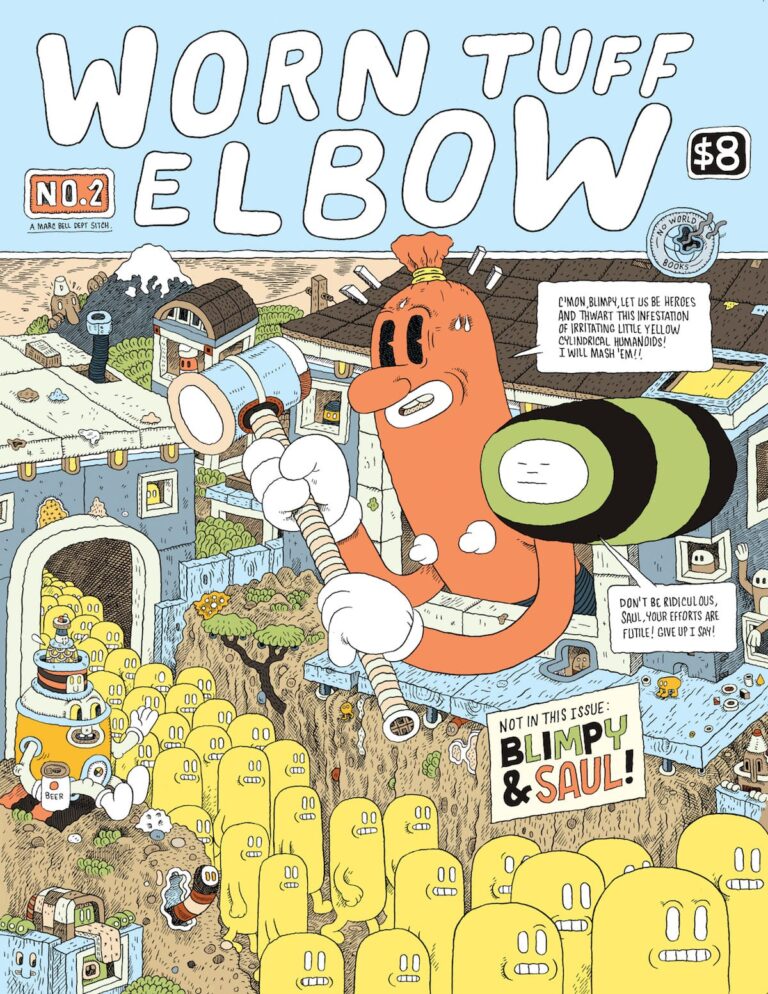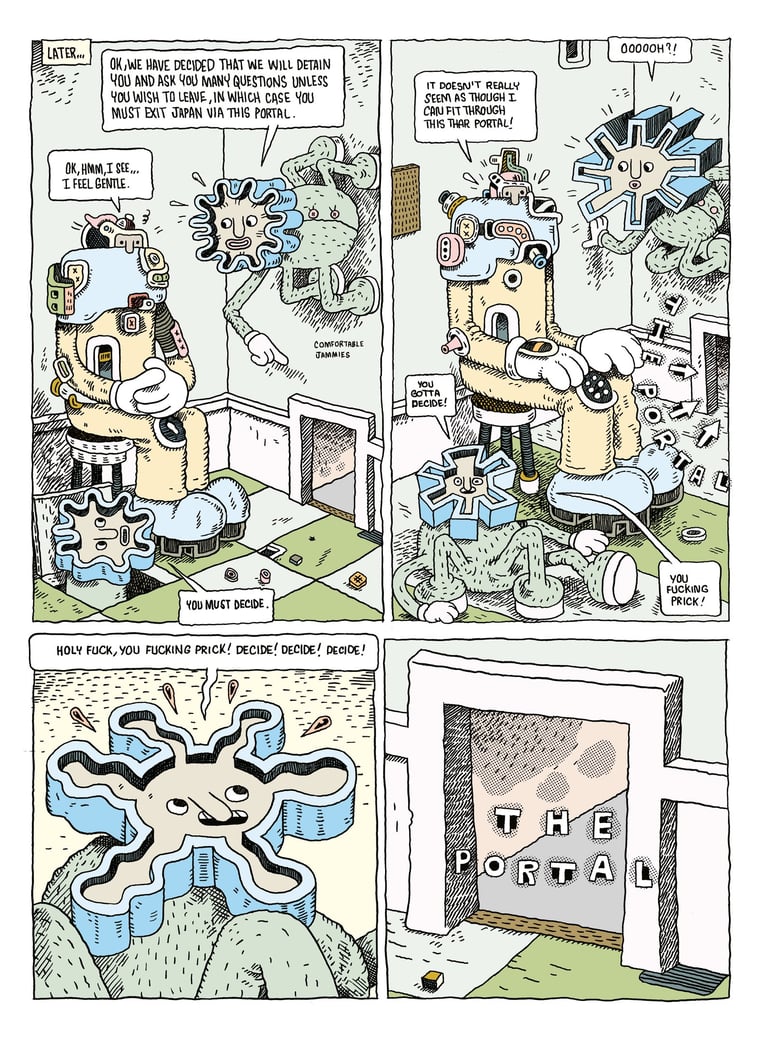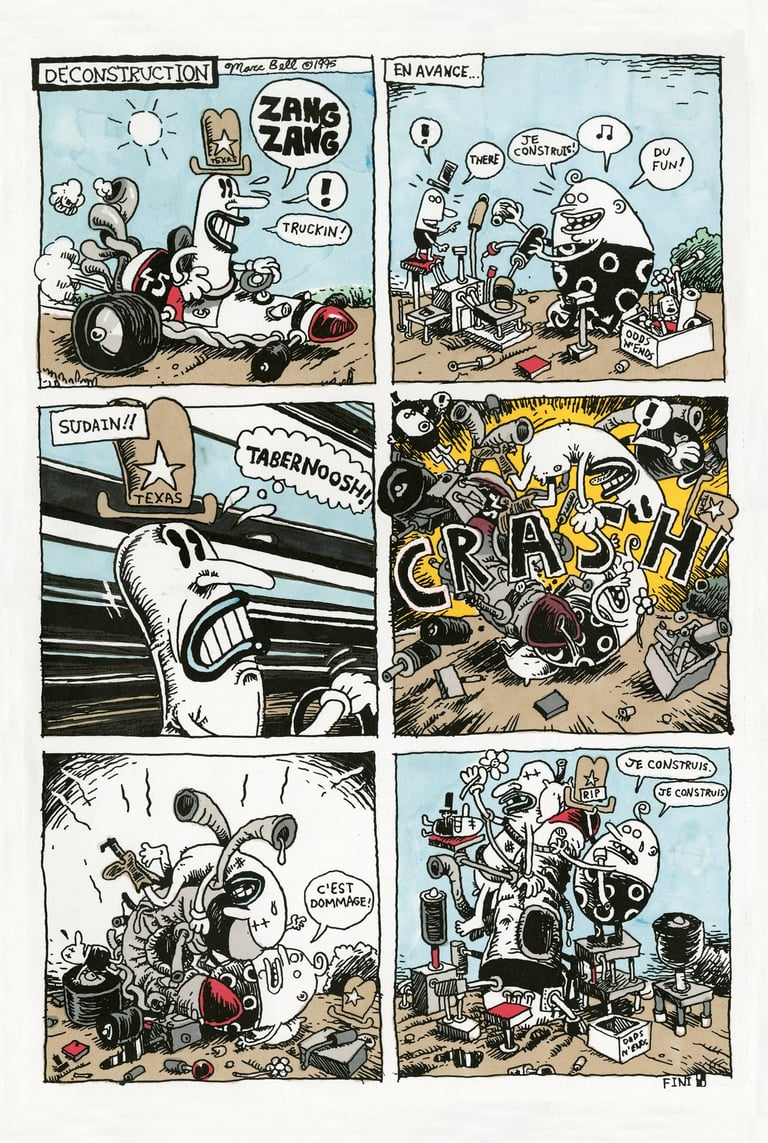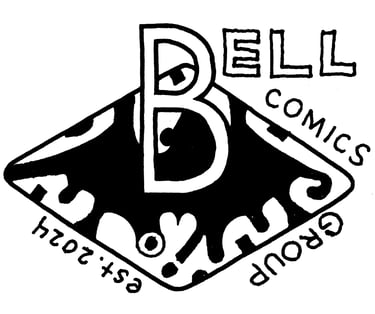

Interview with Canadian Cartoonist Marc Bell
INTERVIEW
5/16/202513 min read
Marc Bell is a cartoonist from London, Ontario whose work has been in countless publications around the world. He now works and resides in Vancouver, B.C.
____________________________
RMP: Congratulations on the release of Raw Sewage Science Fiction. Can you talk a little about the book? What does the title, Raw Sewage Science Fiction mean?
BELL: What does it mean? I don’t know, it’s just maybe an interesting combination of words. In the second chapter of the book there’s a story called Banal Complications. It was originally a small book I made for this publisher in Latvia called KUS!. They publish these little zines–I shouldn’t call them zines–just these little offset printed comic booklets. I think Banal Complications was No. 91 in a series or something, they’ve done a lot of them. Mine was a little unusual for them, it was words and pictures but not exactly comics.
Banal Complications is a banal story about my life, basically–loosely autobiographical. In keeping with the title, I just focused on banalities in life, I didn’t really get that personal. The only sort of outlandish thing in the story is the names of the people and places and I refer to the medium that the protagonist, Chop Salad, works in as “raw sewage science fiction”. So instead of saying comics or art, I use raw sewage science fiction as a genre. But the term actually came up once before in this fake interview that is also in the book.
Raw Sewage Science Fiction is more or less a collection of small, mostly self published booklets spanning 12 years. So I was essentially using that material as “raw sewage” or raw materials to create Raw Sewage Science Fiction.
RMP: Is this different from how you usually put together your books? I have a copy here of Pure Pajamas which is mostly filled with comics.
BELL: Yeah, Pure Pajamas is quite different but I suppose in reality it’s a similar approach because PP is me going through all this comic material that I’d made for different publications; both self-published and published by other people. Then making it into a formal book so in a way it’s a very similar process but the material of course is very different. Like you say, PP is comics. RSSF is a combination of all sorts of things like collage, writing, and some comics.
RMP: So, do you wait until you have enough material while working on multiple projects?
BELL: Things are always overlapping and happening at the same time. For example, RSSF was maybe twelve years of material but it probably took me around five years to put it together, off and on. I believe I made the first draft of it around 2018-2019. Then I realised oh, there’s not enough material on hand to make a satisfying book. So I thought to myself, well I’m gonna be generating more material so I’ll just keep doing that and then it will feed into this book.
At the same time I was also working on proper comics. Around the time I’d created the first draft of RSSF, Worn Tuff Elbow #2 came out–that’s a comic book series of mine–and then more recently, in the fall, a lot of stuff came out. RSSF came out. I finished Worn Tuff Elbow #3 and that came out. I’d also been editing this anthology with this place, Neoglyphic Media, and that came out. It’s called Alive Outside. So, in the fall a lot of stuff came out all at once. At the same time I’ve already made a few smaller publications that will presumably feed into some other book.
RMP: Are you working for any publications regularly or are you working on your own?
BELL: Working on my own. I mean, I do get the occasional invite to be in an anthology. I just submitted a page to Smoke Signal which is a newspaper publication put out by Desert Island, this comic book store in Brooklyn. I think this is the 43rd issue. So I was invited to put together a full page for that and that material will also likely feed into Worn Tuff Elbow #4, which will probably be the place where I try to connect some comics that I’ve done for different anthologies.
I was also in this anthology called Cicadas, which was started by Riley Gale of the metal band Power Trip. He invited me to be in that and then unfortunately he died. His friends decided to finish the anthology, which was a thing he was really excited about. He was really into comics.
I was also in a few issues of this music magazine from the U.S., Maggot Brain, which is put out by Third Man Records. So, I do still end up in various publications and generate material in this way but in the old days I was doing a lot more weekly and monthly strips.
RMP: You were working with some Montreal papers back in the day right?
BELL: Yeah, I think the peak of it was around 2005-2006 when I was doing a weekly in the Montreal Mirror and the Halifax Coast, and I was doing two monthly’s; one for Exclaim! and one for Vice magazine. Then that all kind of went away; Exclaim! got rid of their comics and then I can’t remember if I quit Vice … I can’t even remember to be honest. But then, it all came to a head because I was getting some interest in my “actual artwork” so to speak, to put in this gallery in New York. So, I kind of stopped comics for… geez, I don’t know how many years. But I decided I just wanted to focus on making art for this gallery.
RMP: After you quit comics was there more time to focus on your own direction, instead of constantly pumping out work for publications?
BELL: Oh, yeah, definitely, definitely. It was kind of a huge relief because I was really finding making all of this artwork really interesting and less stressful than coming up with ideas for comics. I was working in sort of an assembly line method making this artwork, which was kind of great. I would start all of these things and then I would just wake up in the morning all excited to work on them with no real deadline.
And I think that’s when I decided that I didn’t want to have any more deadlines. In fact, later on I realized … oh I think I used to have panic attacks around deadlines without even realizing what they really were at the time ha ha.
RMP: So, at the point you quit, were you in a place, financially, where you didn’t have to rely on weeklies or monthlies?
BELL: Yeah, I mean, I’ve always lived really cheaply. I wasn’t really stressed out about money, I’ve always tried to find cheap rent and I’m usually pretty good at budgeting. But, yeah that was a factor, I was like whoa, I can let this stuff go and I won’t have to worry too much.
RMP: You were around in the early days of Vice right?
BELL: Yeah, very early days. I was there when it was called Voice.
RMP: You were working with them already?
BELL: Yeah, I was in the first issue I believe.
RMP: At that point were you living in Montreal?
BELL: I’m from London, Ontario and I went to school in New Brunswick and I started spending time in Montreal because it was in between so I sort of got accepted by the Montreal comics community there. And then, yes, I lived there in the mid-90s.
RMP: And Vancouver now, so you’ve been all over Canada.
BELL: Yeah, I’ve lived in several places.
RMP: Why did you settle down in Vancouver?
BELL: Oh, that’s a whole other story actually. Well, the aforementioned Banal Complications tells the tale in a very banal way. I was living here in Vancouver from 2000 to 2007 and then I went back to Ontario and then I ended up living in–around the year of Donald Trump's first presidency, so 2016?–I lived in Minneapolis for six months and you can only stay in the U.S. for six months so I left in late 2016, I believe, as soon as Trump was elected. So, I had to leave and I didn’t want to go back to Ontario so I ended up going back out to B.C. and staying here. And now I’m trapped here because I was gifted this cheap apartment. So, now I’m trapped in Vancouver, I can’t leave … trapped.
RMP: It’s not the worst place to be trapped.
BELL: No, it’s a nice city. I feel it lacks culture, I won’t go on about that, but it’s a very nice city.
RMP: Your cover of the Montreal Mirror seems to be one of the more famous ones.
BELL: Really?
RMP: Yeah it’s one that comes up if you google Montreal Mirror. I think it mentions Hot Potatoe [sic] on the cover.
BELL: That makes sense, I think It was probably written by Rupert Bottenberg? Yeah, Rupert kindly wrote a piece on me, I guess when Hot Potatoe [sic] came out. When I had my weekly in the Mirror, it was also in The Coast in Halifax. I should say it started in The Coast. I lived in Halifax in the late 90s and I started my weekly for them around then. And then I decided, oh, I should take this more seriously and try to get it in other papers. And I was able to get it in the Montreal Mirror and a paper in Vancouver for a bit but that didn’t work so well.
RMP: Was there a prominent art or comic scene in London when you were growing up?
BELL: You know, I was sort of negative about London growing up there but in retrospect the downtown of London was fairly thriving in the early 90s, there was stuff there. But then, it’s been on a decades-long decline unfortunately. Now it’s a bit sad, like a lot of places. London’s not unique in that regard.
I was always interested in all kinds of drawing. MAD magazine was a big deal for me. I wasn’t into super heroes, I didn’t even go into comic stores until high school. A classmate started showing me these alternative comics so I discovered Chester Brown, Peter Bagge, Julie Doucet. That’s what sort of captured my attention, is I suppose, the stuff from elsewhere. And then I discovered Factsheet Five which was a great resource to connect with people. That’s where I connected with John Porcellino in the U.S., who was making his own zines and running this little distro called Spit and a Half which he stopped for a while but now it exists again and he still carries my work.
There wasn’t really a comic book scene in London that I was too aware of or people weren’t necessarily interested in what I was interested in but I was just really determined to do it, and I just started doing it, I started self-publishing. I was pretty determined to make comics and make art. I started self-publishing when I was a teenager. My first comic was published by a place in Michigan called Caliber Press. I was sending out my comics and getting rejected but they accepted my work so I published my first comic book with them.
RMP: And then you ended up going to art school right?
BELL: Yes, in fact, that was kind of happening at the same time. I ended up going out to art school in New Brunswick.
RMP: Did that have a big impact on the way you work?
BELL: It was very helpful in a way because it was a traditional art school so there was a lot of drawing, there was no real theory. It was like, drawing and painting … and a lot of drawing and that was really great, a lot of life drawing. I consciously decided not to present comics in the art crits there. I would just, you know, go through the regular motions but I was still drawing comics. While I was there I was drawing the second book for Iconographics (Caliber Press) and then I got the job as the comics editor at the school paper. At that time they were still printing from paste-ups. So I’d be given like two pages and I was pasting up the artwork that would be given to the printer and they’d be photographing it on a copy stand. So, I wasn’t using a computer or anything. I didn’t know how to use a computer. I didn’t figure out how to use a computer until 2000 or something.
RMP: Do you prefer before or after the computer in terms of working?
BELL: Well, I suppose it used to be a simpler process in that, as a cartoonist you would just draw/design your page and you’d be handing it off to someone and you’d have to trust them to lay it out. But they would do all that. Now cartoonists tend to be way more part of the process. What is also interesting, I find, is to be part of this very narrow group of people who made art before computers took over essentially, and then are still making it after. Industrialization changed everything but how long did that take? That took a long time. This digital situation/transition didn’t really take that long.
It’s good for me now because I’m drawing things by hand but then I’m controlling the printing situation. I do all my own design and stuff. So, in a way it’s good for me because I don’t have to worry about anyone else’s mistakes, if there’s a mistake it’s on me. However, as far as the non-digital goes: there is something to be said for the way something looks when it’s created by hand or laid out by hand–made as a physical object before it gets printed. There’s something to be said for that because now a lot of things look the same so it’s almost like one has to fight against that to maintain the physical integrity of the art as it exists in the real world. Do you know what I’m saying? That’s a little abstract.
RMP: A lot of people are making all of their art on the computer now.
BELL: Yeah, and I think what I mean to say is that there’s something really nice … like say, zines and stuff. Someone is making a zine and they’re pasting it up using glue and paper and it has this real physical quality and it’s not perfect and then you see it reproduced. In the old days, so to speak, I’m slapping a paste-up right on the photocopier and there’s nothing in between, it’s just me and the photocopier and the paper.
RMP: Yeah, it’s almost similar to recording on tape if you’re playing music. So you had to learn a lot of new things, like Adobe and other programs?
BELL: Yeah, and essentially, I’m using these digital tools in such a way to try to maintain the original object. Like with Photoshop, I’m making bitmaps for the black and white artwork to be able to print it sharply. Nobody would stand for fuzzy fonts, nor should they tolerate fuzzed out hand-lettering. You know, unless it is for effect. So, I’m using Photoshop but I’m trying to use it in ways to preserve the integrity of the original art. I’m also using Photoshop to colour so there are different things going on. There are false things going on … I shouldn’t say false, but you know what I mean. I am creating art on the computer as well, I’m colouring and doing different things.
RMP: But you never draw on the computer?
BELL: No, not really. I’ll make corrections on the computer. Say I’m cleaning up one of my aforementioned bitmaps, then I’ll take out crud and I’ll fix mistakes and then sometimes when I see it printed I can tell, I can look at it and go ‘that’s when I used my old wacom bamboo tablet to fix that R’ you know?
RMP: To get back to when you first started publishing comic books, do you remember reading your early reviews? Did you receive any bad reviews early on?
BELL: I mean, I would get pretty excited just getting any attention, there were bad reviews. There was a lot of criticism for my weekly in The Coast, there were people writing hate mail.
RMP: Really?
BELL: Yeah, yeah, people writing hate mail about the strip. In fact, the editor didn’t want to show some of the letters to me, because one person writing in was fairly unhinged. I reprinted some of the hate mail in Shrimpy And Paul And Friends. And I did get my hands on some of the wacko stuff and I believe some of that was printed in Worn Tuff Elbow #1.
I remember there was this garage rock magazine called What Wave from London, Ontario and this guy, Mike Niederman, he would review comics in there. He would do it in a very thoughtful way, I believe he was handwriting the reviews and he was very nice about my under-developed comics. In fact, he worked at a local print shop in London and he gave me crazy deals to print these early zines of mine. Apparently they were being printed offset? And I was only doing like 200 copies. He was very cool, he was very supportive.
What Wave was a garage rock magazine, so … you know in those days there was no internet. So you’d look at–this was the late 80s or something–I would look at What Wave and I’d read the whole thing so I’d be reading about all these garage rock bands that I had never heard of or listened to. A lot of them were in Montreal, so then I knew info about all these bands but I never really heard their music until later, you know? So that was kind of funny.
RMP: Do you have any advice for a young comic book artist or a young artist in general? Maybe a high school kid.
BELL: This is a difficult question because I think the world has objectively changed. I don’t think this is just about me being a grumpy old man saying “things are different now”, etc. My only advice would be to “draw and then draw and then draw again”. Look at interesting things. Try to have fun in an increasingly “un-fun” world. Egads, it’s brutal in so many ways. Try not to join the digital monoculture where everything becomes super processed and similar. Don’t listen to idiots. Look at lots of different things and dig around.
RMP: Where can people find your work?
BELL: Well, in Montreal the D&Q store should have things by me. My instagram is @marcbelldept. This year I need to get my website going, it has been a placeholder for a while now. And I suppose I should put my bigcartel doohickeys back online too.






RUNNING MAN PRESS
CoNTACT
info@runningmanpress.ca
© 2024. All rights reserved.
ads@runningmanpress.ca
